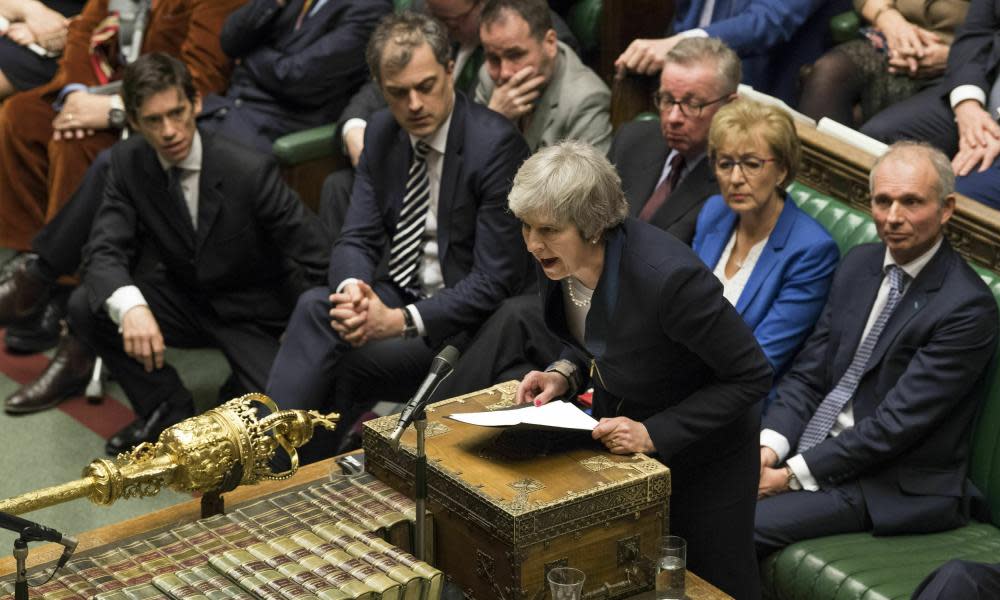'Great theatre – but tragic': Europe's media reacts in horror to May defeat

Europe’s media and commentators had few words harsh enough for the mess in which the UK – and Europe – now find themselves after Theresa May’s deal suffered a crushing defeat in the House of Commons.
In the Netherlands, Volkskrant columnist Bert Wagendorp was particularly brutal: “It is almost certainly the case that in recent European history, absent a threat of actual war, no country has landed itself in such complete and utter chaos,” he wrote.
“The oldest parliament in the world after Iceland’s is in one hell of a state. Brexit has split a once stable country in two and transformed its politicians into lemmings, throwing themselves off the white cliffs into the sea. It’s great theatre – but tragic.”
Writing in the Spanish daily El País, Lluís Bassets warned that Tuesday’s vote had been far from decisive, despite the scale of May’s defeat, and worse could be to come.
“To the misfortune of the British, and perhaps also the Europeans, this Tuesday was a historic day that does not preclude more historic days – all accompanied by the tragic storm clouds that tend to shadow history,” he wrote.
Bassets said “the great shredding machine that is Brexit” was still hard at work, “fed by uncertainty, bitterness and rancour – the three dismal feelings that May evoked in her defeat speech, and the three evil spirits that only grow with each day that Brexit remains unresolved”.
In an editorial, the rightwing ABC said that since neither May nor parliament had shown themselves capable of dealing with the crisis, “the most sensible thing to do would be hold another referendum, as voters get to grips with the true arguments rather than just the nationalist-populist propaganda of the pro-Brexit lobby”.
The online paper eldiario.es noticed that the environment minister, Michael Gove, had invoked the famous Game of Thrones line, “Winter is coming”. Gove was “one of the heavyweights in the party, that had the most influence in the Brexit referendum”, wrote Iñigo Sáenz de Ugarte.
“Gove and others like him brought winter to British politics and are now horrified at how cold things have got. Too cold for their fellow countrymen.”
In Sweden’s Aftonbladet, Wolfgang Hansson said May’s historic defeat flowed from “one of the biggest mistakes a British prime minister has ever made: David Cameron’s promise in 2013 to hold a referendum on Britain’s EU membership”.
That decision had “divided the British people into two tribes that over time have become bitter enemies”, Hansson said. “A proud, once-great power is now dedicated to committing serious self-harm – which could also damage Sweden … And no one, I repeat no one, knows what will happen now.”
The German press was more constructive, Berliner Morgenpost saying the situation in the UK was now so desperate that the EU must adapt. “The bloc has negotiated hard, wanting to set an example, and has pushed May right up against the wall,” it said. “It’s time for the EU heads to leap over their own shadows and offer a compromise. It is not yet too late to give May support.”
The Rheinische Post, however, asked what might happen if the British stayed. What sort of country would it be? A “traumatised partner … would be far harder to integrate than before,” it said. “A politically hopelessly divided and lame Britain could cause a great deal of harm within the EU.
“Which is why, for both sides, it would actually be better if the British were to complete their exit. If they then notice in the next few years that the EU maybe wasn’t the hell on earth they had thought it to be, they could gladly return.”
France’s Les Echos said it was “difficult to say what will happen” over the next few days, since “the rejection of the text by such a huge margin, 70 days from Brexit day, risks plunging the country into deep uncertainty”.
Le Monde had a portrait of May (“Shipwrecked by Brexit”) saying the prime minister was “valiant, but without a clear vision on Europe … She has shown herself, for the last two years, incapable of implementing Britain’s exit from the EU.”
The paper said the rejection of the Brexit text “aggravates the uncertainty over the UK’s future.” Europe1 radio said the defeat was “humiliating” for the British prime minister, while France Inter radio described the defeat as a “coup de Trafalgar”, with the prime minister hit – though not necessarily knocked down altogether.
In Italy, Enrico Franceschini said – with apologies to Winston Churchill – in La Repubblica that Brexit “has revealed itself as a riddle, wrapped in a mystery, inside an enigma: cancelling it would entail problems – but that could be the only way out of the labyrinth it has created.”
In La Stampa, Stefano Stefanini warned that, without an agreement, 29 March “will be chaos. The risks extend beyond the Channel, where emergency plans are already being made for medicines and food. Repercussions would also be felt on the continent.”
In Greece, the media was in rare agreement that the UK was in uncharted waters. “There is astonishment that a democracy as old as Britain has got itself into such a dead end,” commentator Pantelis Kapsis said. “It’s the sort of mess Greece would get itself into.”
The Efimerida Twn Syntaktwn paper, which often reflects the views of prime minister Alexis Tsipras’s leftist government, predicted that while May would likely survive tonight’s confidence vote, the most likely scenario was an extension of the country’s exit date until July “in order to give London more time”.
The conservative Kathimerini, in particularly pessimistic mood, said prospects for an alternative solution were far from good.
Reporting team: Sam Jones in Madrid, Kim Willsher in Paris, Kate Connolly in Berlin, Angela Giuffrida in Rome and Helena Smith in Athens

 Yahoo News
Yahoo News 
